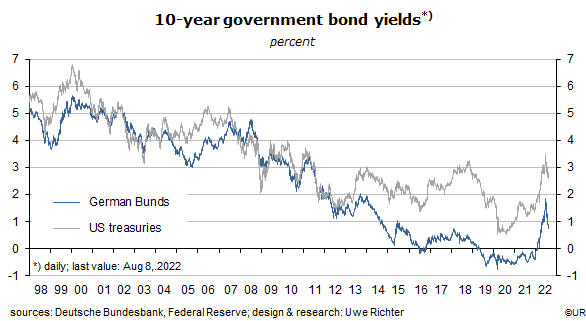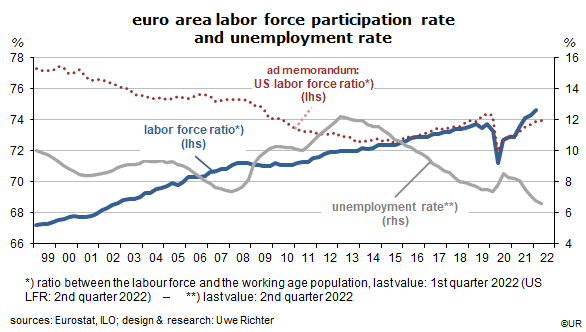Dieter Wermuth, Economist and Partner at Wermuth Asset Management
Rarely have economists been as confused as today.
In the US, seasonally adjusted real GDP has recently shrunk quarter-over-quarter, if only by fairly modest percentages. Even so, labor markets continue to boom: the unemployment rate has fallen to 3.5%, lower than anytime over the past 50 years, and the number of new jobs is up 4.2% y/y, also a new record. At the same time, consumer price inflation keeps rising and has now reached 9%. Going by industrial producer prices as a leading indicator (up 25% y/y), the 10% barrier will soon be reached and breached. In spite of this, yields of long-term dollar bonds have been on the way down for several weeks, reflecting very optimistic inflation expectations. Never before (as far as I can remember) have real government bond yields been so far in negative territory.

The euro area is also heading toward recession. Caused by the explosion of energy prices and their knock-on effects on other goods (especially food) and services, the purchasing power of households has declined a lot. In Germany, for instance, real retail sales were down 3.9% y/y in Q2, and down 14.7% annualized between Q1 and Q2. The 32.7% y/y increase of producer prices means the outlook for German consumer prices is pretty dire. But, surprise surprise, the labor market could hardly be in better shape. Employment has increased steadily at rates of around 1.3% while 500,000 refugees from Ukraine have been smoothly integrated into both the society and labor markets. In the euro area as a whole, the unemployment rate fell to 6.6% in June, the lowest number since the start of the currency union. Again, we have a combination of weak or negative real GDP growth and a very robust labor market.
Since recessions which are not accompanied by rapidly rising unemployment are not regarded by the public as catastrophes, central banks have considerable room of maneuver – they meet no resistance to their plans to raise policy rates in large steps, at least until early 2023. They accept that in this way they reinforce the recessionary effects of the energy price explosion. Fighting inflation has top priority.
Since market participants believe that both the ECB and the Fed will succeed in that fight, bond yields have steeply declined in recent weeks. Yields on 10y Bunds have fallen from an intermediate high of 1.9% in March to just 0.8% now, while US Treasuries have gone from 3.4% to 2.7%. The expectation is obviously that the coming recessions will push down inflation to very moderate levels once again. Wages are rising somewhat faster than before the pandemic, but there no signs yet of a dangerous wage-price spiral. Add to this that the world market price for crude has declined 29% since its high on March 8. All this explains why financial investors are at present content to hold on to government bonds which yield only minus 7 to minus 8% in real terms, probably the lowest ever in peaceful times. They wait and hope for better times.
The big puzzle in all of this is the labor market. It looks as though it has been fully decoupled from GDP trends these days. Firms are reducing their output, or increase it by very little, yet they eagerly continue to hire. They seem to expect the coming recessions will be brief and flat – and that they are now faced with a structural weakness of labor supply.

People may have come to like the new flexibility of working hours and locations (home office) and are less willing to accept the horrors of the daily commute. The pandemic may also have taught them that a perfectly happy life is possible without trying to maximize consumption. Since their financial assets, including claims against pension funds, real estate, equities and bonds have increased relative to income for many years, they are now in a strong position when negotiating with potential employers. I say this without much empirical evidence, but it seems plausible that workers in rich countries have more and more options regarding their working life. Labor markets are less rigid and predictable than, say, the market for potatoes. To be sure, the situation remains very different in the poorer parts of the world where the majority of humanity lives – there, unemployment will still automatically rise when recession hits.
Since North American, European and Japanese capacity reserves are getting bigger, it will become more difficult to pass on costs – which puts an upper limit on how much consumer prices may rise from here. It helps that commodity prices have gone on a downward trajectory. It is now probable that consumer price inflation is near its peak and may soon fall a lot. Bond markets are thus well supported. As to equity markets, declining long-term bond yields mean declining discount factors of future cash flows and profits, ie, rising present values and stock prices. The coming recessions have a negative impact on corporate profits and share prices, while falling discount rates work in the opposite direction. It seems that the big sell-off of equities may still have to wait.
###
For more information please contact:
Instinctif Partners
Lars Hofer // Johanna Franck
E lars.hofer@instinctif.com // johanna.franck@instinctif.com
T +49 162 562 8917 // +49 69 133 896-24
Visit us: https://wermutham.com/
Follow us on Twitter and LinkedIn
About Wermuth Asset Management
Wermuth Asset Management (WAM) is a Family Office which also acts as a BAFIN-regulated investment consultant.
The company specializes in climate impact investments across all asset classes, with a focus on EU “exponential organizations” as defined by Singularity University, i.e., companies which solve a major problem of humanity profitably and can grow exponentially. Through private equity, listed assets, infrastructure and real assets, the company invests through its own funds and third-party funds. WAM adheres to the UN Principles of Responsible Investing (UNPRI) and UN Compact and is a member of the Institutional Investor Group on Climate Change (IIGCC), the Global Impact Investing Network (GIIN) and the Divest-Invest Movement.
Jochen Wermuth founded WAM in 1999. He is a German climate impact investor who served on the steering committee of “Europeans for Divest Invest”. As of June 2017, he is also a member of the investment strategy committee for the EUR 24 billion German Sovereign Wealth Fund (KENFO).
Legal Disclaimer
The information contained in this document is for informational purposes only and does not constitute investment advice. The opinions and valuations contained in this document are subject to change and reflect the viewpoint of Wermuth Asset Management in the current economic environment. No liability is assumed for the accuracy and completeness of the information. Past performance is not a reliable indication of current or future developments. The financial instruments mentioned are for illustrative purposes only and should not be construed as a direct offer or investment recommendation or advice. The securities listed have been selected from the universe of securities covered by the portfolio managers to assist the reader in better understanding the issues presented and do not necessarily form part of any portfolio or constitute recommendations by the portfolio managers. There is no guarantee that forecasts will occur.
Read the full article in PDF format here: English.
